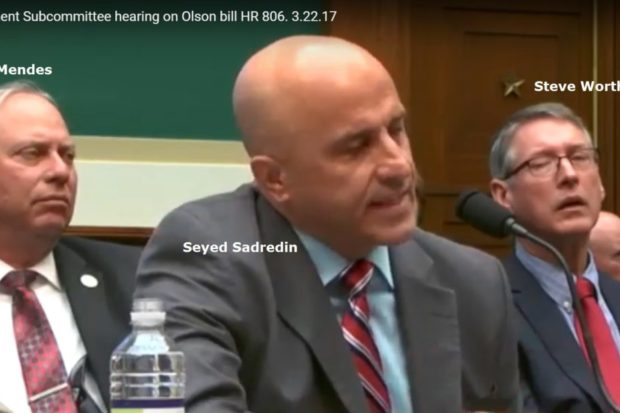
By Tom Frantz
HR 806, the Ozone Standards Implementation Act of 2017, is the brainchild of our San Joaquin Valley Air Board, and it is being sponsored in Congress by Valley legislators Jim Costa (D–Fresno), David Valadao (R–Hanford) and Kevin McCarthy (R–Bakersfield).
March 22 was our Air Board’s time in the limelight in Washington, D.C. After two years of failing to get similar legislation passed under Obama, pious and indignant Board members, Supervisors Steve Worthley (Tulare County), Bob Elliott (San Joaquin County), Buddy Mendes (Fresno County) and Craig Pedersen (Kings County) and Fresno City Council Member Oliver Baines, all resolutely represented their constituents, the biggest polluters in the Valley, at the nation’s capital. The air district chief, Seyed Sadredin, herded them to the hearing room where the Energy and Commerce Subcommittee on Energy and the Economy listened to their whining.
HR 806 is subtitled “To facilitate efficient State implementation of ground-level ozone standards, and for other purposes.” It is the “other purposes” that will gut the Clean Air Act and hurt the residents of the San Joaquin Valley.
HR 806 has been written to delay the attainment dates of all new air quality health standards and take away any penalties for failure to reach those standards on time. It is a double whammy for those Valley residents who are sensitive to air pollution (virtually everyone).
During the hearing, Sadredin testified falsely about the $52 billion it will take to clean up the Valley’s air and how even that amount will not quite get us there. He seemed to be unaware that it is a federal crime to lie to Congress. We cannot blame him, though, with the example that Trump has set. Sadredin cried wolf about the devastating consequences of sanctions that will be imposed on Valley businesses when they fail to attain the standards on time. He lamented the fact that our low-income residents, already suffering from high unemployment, would be hurt greatly by these sanctions.
The sanest voice on the Energy Committee, Rep. Raul Ruiz, M.D. (D), of Riverside and the Coachella Valley, told Sadredin he had things ass-backward. Ruiz stated eloquently that it is not for the working families and the poor, who face the highest burden of illnesses due to poor air quality, that we should weaken these regulations and protections. He said it is actually counterintuitive to help the CEOs of these big companies maintain their profits instead of protecting the health of minimum wage workers.
Fortunately, Kurt Kaperos of the California Air Resources Board was able to talk some sanity back into the room. His testimony, below, was elegant and to the point.
First, meeting health-based, health-protective standards for air quality is achievable.
Second, economic growth and development while cleaning the air are not only possible, but in California are a reality.
And, third, weakening the Clean Air Act, as HR 806 would do, is unnecessary and will harm the health and well-being of millions of people.
With its science-based, health-protective air quality standards, its meaningful deadlines and its requirements for comprehensive plans, the Clean Air Act has been California’s tool for achieving air quality and economic success. The Clean Air Act requires comprehensive planning. HR 806 would delay planning and increase costs in the long term.
California’s success is proof that HR 806 is unnecessary. It would inappropriately insert control costs into the EPA’s science-based process for setting air quality standards. How healthful the air is to breathe is not determined by the cost to clean it up. It is a question of science and what air pollution does to the human body.
HR 806 would mean more people would breathe dirty air longer. It would unwisely mandate that we ignore the pollution effects of weather conditions made worse by man-made climate change. It would push off deadlines, erode requirements for incremental progress and undermine the Clean Air Act’s requirements for comprehensive air quality strategies.
In closing, let me stress that meeting health-protective standards is both achievable and cost-effective. The Clean Air Act provides the flexibility to do this.
Setting healthful air against economic prosperity is a false choice. California continues to show that clean air and economic growth go hand-in-hand.
And, finally, delaying the standards will harm the health and well-being of millions of people in this country. The San Joaquin Valley, in particular, is home to high rates of poverty, pollution, and asthma. It is especially critical to continue progress in that region.
And in the end, the economic costs and the human cost of polluted air far exceed the costs of cleanup.
*****
Longtime clean air advocate Tom Frantz is a retired math teacher and Kern County almond farmer. A founding member of the Central Valley Air Quality Coalition (CVAQ), he serves on its steering committee and as president of the Association of Irritated Residents. The CVAQ is a partnership of more than 70 community, medical, public health, environmental and environmental justice organizations representing thousands of residents in the San Joaquin Valley unified in their commitment to improving the health of Californians. For more information, visit www.calcleanair.org.
